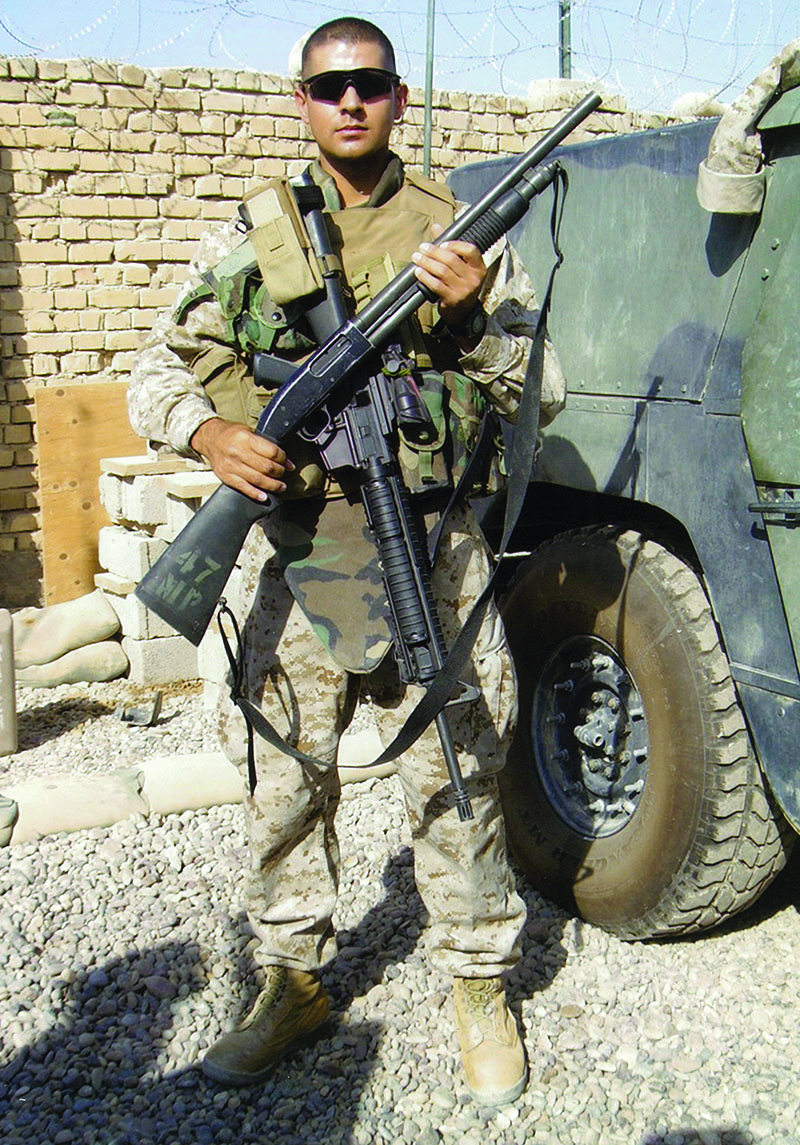
A Corps Experience: Hollywood Writer Graham Roland Got His Start as a Marine
By: LtCol Joel Searls, USMCRPosted on November 15, 2025
In 2000, Hollywood scriptwriter Graham Roland enrolled in college, halfheartedly taking classes at Cal State-Fullerton when he decided he needed a challenge. He wanted to become a writer but needed money for school. A California resident who spent his summers with his dad in Oklahoma, Roland was also looking for a male role model in his life and found it in the Marine Corps.
“Coming out of high school, I was an OK student, not a great student,” Roland said. “I had already formulated this idea I wanted to write and hadn’t really focused in on writing for film and television yet, but I knew that I needed something to write about.”
Initially motivated by the promise of the GI Bill, a couple of key experiences inspired Roland to join the Corps. A friend of his had joined the Marines right after graduation, and his transformation left an impression on Roland.
“I saw him when we came back and he was like a totally different person. … His personality, the way he carried himself … [In school] he was a knucklehead, he wasn’t very focused. He was a good student … after boot camp leave. That really changed him. That stuck in my mind.”
Roland enlisted in the Corps in 2000 at a recruiting station in the Bay Area and completed boot camp at Marine Corps Recruit Depot San Diego. He trained for two months at Fort Sill, Okla., to become a forward observer, 0861 MOS, in artillery, and the base was about two hours from where his dad lived.
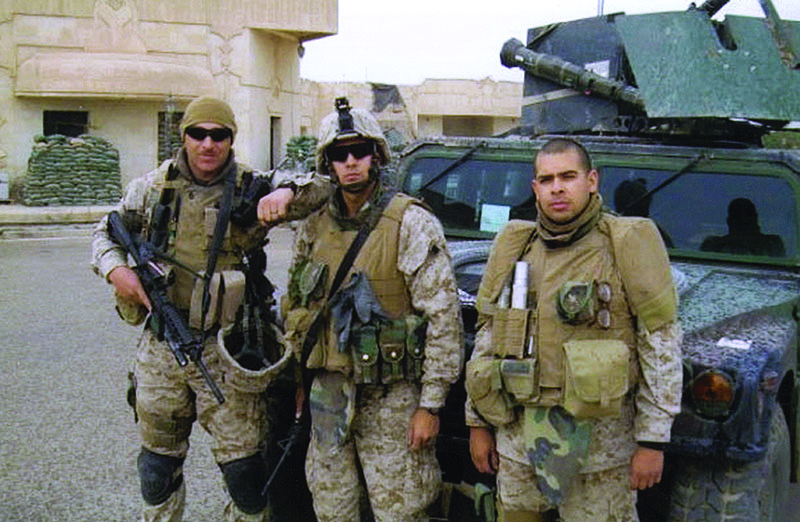
Roland had come of age in the ’90s, and believed there wouldn’t be another ground war. The ’90s involved a lot of bombing people, and Desert Storm happened fast. But by the time he deployed to Fallujah in 2005, the Corps didn’t need forward observers. He had been taken out of his artillery battery, where he was a reservist in Seal Beach, Calif., and put with an active-duty field military police (MP) company, the only MP company in the 1st Marine Division. Roland didn’t do anything artillery focused during the deployment. Instead, his unit executed convoy security and prisoner transfers in country. They also did security for Personal Security Detachment missions around the election, escorting high-value individuals.
“[We would] take them to a house in Ramadi. Watch the house, they would come out and we would take them back to Camp Fallujah.” In hindsight, he said he liked how it turned out. He didn’t know what it would have looked like to be in an artillery battery during the occupation phase of OIF. He had friends he trained with who had been part of OIF 1 in 2003. When it came time for Roland to go the war, “it had shifted into such a different place,” he said. “I am grateful for how it happened.”
Within his MP company, Roland, a corporal at the time, led a small unit of 25 to 30 reservists. The reservists attached to three platoons. Most of his platoon was active duty, doing their second or even third tour in Iraq.
“They whipped us into shape, told us what to expect, and I felt a great measure of comfort being with these guys because they had done it before,” Roland said. He got to see much of the country during deployment because his team, while based in Fallujah, was constantly moving between Baghdad and Ramadi. His team even went to the Syrian and Jordanian borders. “We were on the move a lot,” he said. “It was an exciting job to have.”
Having arrived in Fallujah in September, his team spent the winter working almost exclusively at night. They didn’t have a lot of enemy contact or activity during the winter, but that changed as the weather turned and got warmer, with longer days around mid-February 2006. Roland recalled, “The last couple of months of our deployment, things really started to pick up. We went through a period of a couple of weeks [where we] got hit with IEDs three or four times in a really short period of time.” Nobody was severely injured because their vehicles were up-armored, although a few of his teammates were concussed. Roland’s own vehicle was hit. He didn’t see the IED, but his driver saw it and swerved the truck violently, thinking it looked like an 88 mm mortar wired with a piece of detonation cord.
“I don’t remember the incident,” Roland said, “but the aftermath of it … being in shock and looking for the people that might have set it off.”
They finished the mission and headed back to base. He remembers the adrenaline. “I was young, we all were young. I thought naively that nothing bad was going to happen to me. Nothing really did … it was scary, but physically I was OK.
“The IED was on my side, and had he not [swerved] we would have rolled right over it. The one soft spot in the humvees was the undercarriage; he could have driven right over it. … Who knows, it might not have done any damage … that was the first time I felt like, ‘This is real.’ ”
It was jarring for him, and near the end of the deployment, it put him in a “different mental space for the rest of [his] time in country.”
“I was very hyper-focused, and so hyper-aware, every time we left the base; we were all counting the days; ‘We’re almost home, nothing bad can happen.’ ”
After their deployment, some of the Marines whom he had served with in Iraq ended up going to Afghanistan. “The stories I heard, it was much more kinetic, and the fighting was much more [like] Vietnam. For us, our deployment was like fighting ghosts. You would get hit with an IED, or someone would shoot off a couple of rounds at your direction, and they would just be gone.”
He remembers the frustration of the enemy taking cheap shots but never having the ability to confront them. He remembers enemy attacks as poorly executed and not very effective. “In our battalion, we had a couple of people KIA doing security at a polling station when a suicide bomber was in line and detonated his vest. It was in our battalion, but not my platoon or company.”
Roland shared a vivid memory from his deployment. “[There was] a guy that was, in hindsight, doing a dry run to see what our reaction would be. … We were on our way back to Abu Ghraib, and he was coming at us from a frontage road. We passed him, and the .50-cal from the truck behind us engaged him. He didn’t stop. ‘Shots fired’ came over the radio, and we stopped. [Our] gunner put a lot of rounds in the engine block and wind-shield, completely disabled the vehicle. I thought that guy was dead. We surrounded the vehicle, and he came out.
“He survived and, even with all those rounds, he had only lost his thumb. It was like a miracle. There was nothing in the vehicle. … We had given so many different warnings with flares, used our escalation of force (EOF), and everybody knew the EOF rules.
“This guy went way past it. … You could tell they were planning something, and this was the dry run. They were poking the bear to see how we would react to it.”
A lot of Roland’s memories of Iraq are in the gray-green night vision goggles. His team wore the old, heavy ones that give you headaches. He and his team had to learn to drive and operate at night, wearing them for hours on end. They would operate blacked out (with no lights) and experienced lot of tense moments that were so “eerily spooky that you didn’t know what was going on, and it ended up being nothing.”
His team called their trail vehicles “ghost vehicles,” and when he got promoted in country to sergeant, he was put in charge of one of them. Roland’s job at the end of his deployment was to be the first one out of the wire, to check to make sure there was nothing laid out in the road. He’d be “getting out of the truck and deciding if it [was] enough to call explosive ordnance disposal on a pile of trash in the road. Either we had extra-ordinarily good luck or, by combination, they just weren’t very good.” His team’s experiences were after the Battle of Fallujah, “so it wasn’t totally safe, but nothing like it was.”
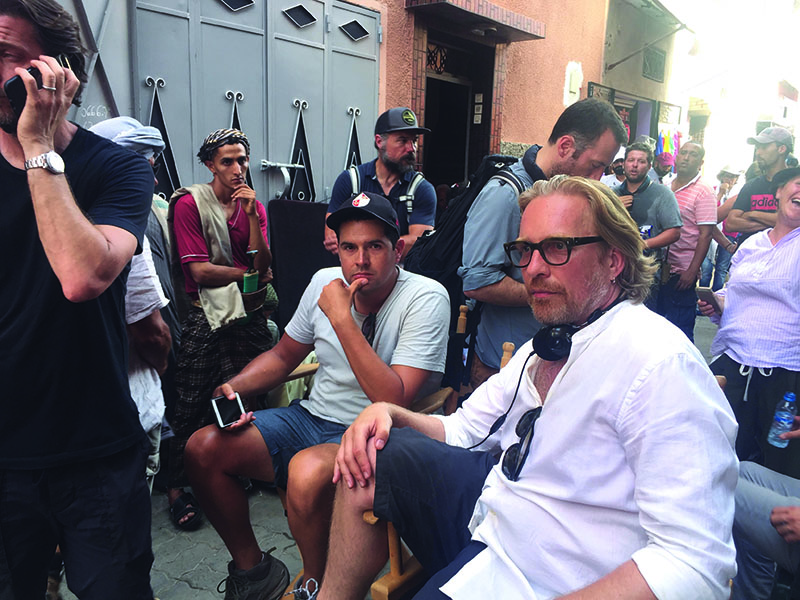
Roland’s enlistment was up six months after he returned. He had a year of college left. He changed his major from film and took a writing class taught by TV writer/producer Robert Engels (“Twin Peaks,” “Andromeda,” “SeaQuest DSV”). Engels was teaching a class that had never been offered at the university before, on the one-hour TV drama. Roland had taken other writing classes but had “no aspirations at all to be a TV writer. I wanted to work in features and be a director. I thought my career was going to be very different.”
He wrote a spec script, a hypothetical episode, of his favorite series, “The Sopranos.” He turned out his first round of pages for the professor about three weeks into class. At the end of one class, Engels said, ‘Who’s Graham?’ Roland responded with, “That’s me.” He said, “Oh, yeah, the Marine guy … Walk with me to my next class.”
Engels told him, “I really like your writing, but I’m curious about your experience in the Marines. I’m wondering if you can write me an original pilot about being a Marine and your experience overseas. It doesn’t have to be true; it just has to be inspired by that.”
Roland said, “I think I can do that.”
Engels replied with, “If you can do that, I will give you an ‘A.’ All you have to do is finish it. It doesn’t have to be good. Give me 50 pages of you and your story.”
He wasn’t doing this with anybody else in the class; he was making them spec their favorite TV show. Engels wanted to see what Roland could do. Roland “rogered up” and finished the script. Engels gave him notes as if he were a working writer.
When he finished, Engels said, “I think you can do this for a living.”
Roland had never met a working TV writer, and this experience boosted his confidence. Engels helped him get a manager within a couple of weeks of graduation. The manager told him to move out to LA.
“He really got the ball rolling,” Roland reflected. Engels’ practical advice and support stemmed from his own experience as a working writer on “Twin Peaks,” a show Roland loved growing up. Telling Roland he thought he could “make a living at this,” he said, was maybe the “biggest thing that ever happened to me, career-wise.”
“It went from being like, ‘We’ll see how it goes,’ to a tangible kind of thing where this guy believes I can do it, and now I believe I can do it. I got very lucky. That same spec I wrote about being in Iraq, it got me a manager, an agent and my first job on the show ‘Prison Break,’ all within a year.”
He’d been back from deployment for less than two years when he started his career on “Prison Break.” Using his Marine Corps experience as a touchstone, Roland said, “Really, had I not had that [deployment] experience, I could have never written that script. … Looking back on it, I didn’t know anything. … I knew very little about being a writer. I learned about being a writer after I got a job being a writer.”
Early in his writing career, although he was inspired by certain shows, Roland was unable to sit down and have a clear concept of what made “a good drama.” He struggled to tell someone what made a good scene and settled for things he thought were “cool.” Conveying authenticity, though, was something he was good at.
Authenticity is what people respond to in his writing.
“All those moments and characters … that I came across in my deployment [were given an outlet in that] script,” he said. The script was science fiction, not based in reality at all, but “it was the setting … the world … how Marines talked to each other. How the characters interacted was what people responded to.”
The script he wrote led to his second job on “Lost.” He had the opportunity to co-write three episodes for the hit show. The opportunity introduced him to producer and showrunner Carlton Cuse, who he has worked with several times since. They even produced one of Roland’s own shows together. “That spec did everything for me,” he said. “It changed my life.”
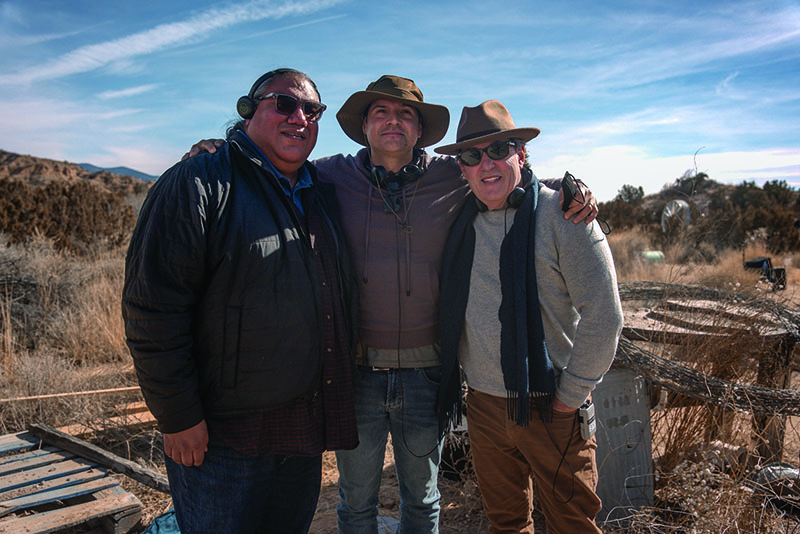
Roland carries the Marine Corps’ training with him—the perseverance and putting in the hours to continue pushing forward when “you think you can’t anymore. That is definitely something I got from being a Marine … and the tactfulness and chain of command. All of those things I learned there has played a role in my career.”
Roland drew on his Marine Corps service to co-create the hit Amazon Prime Video “Jack Ryan” series. “I had done some traveling, but I had never been to a place that was seemingly so different from my home [than when I was in Iraq]. These people are a lot more like me than people realize. That was born out of being around them every day. Their lives were kind of existing around us. Seeing the majority of them just wanting the same things we all wanted—take their kids to school, take care of their families, be able to work, [although] yes, there were differences. … When we decided to do a story on Islamic extremism, the antagonist for that season was a Middle Eastern terrorist. I remember … thinking, ‘If I am going to do this, I am going to do my best to show that person’s story too.’ ”
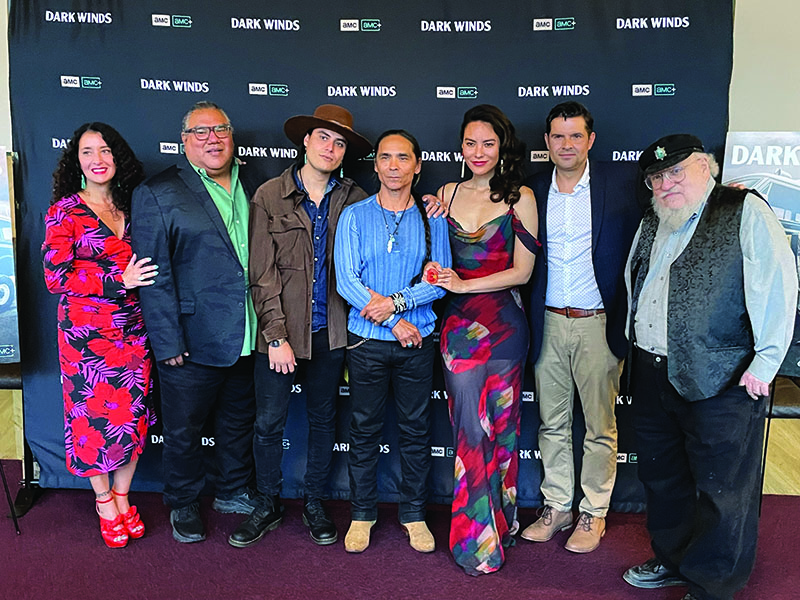
He wanted to show “how they could have gotten to that place. That is why the pilot started out with the [character] when he was a little boy. You find out that this extremely traumatic event happened to him and his brother. There is a scene in one of the episodes I wrote where he is playing an Arabic version of Monopoly. They were all little attempts to say this person is misguided and lost, but I think, at the core of it, there is more to the story and to people, that [they] are more similar than dissimilar. I don’t think I could have done that storyline had I not deployed and had that experience.”
Roland’s new series, “Dark Winds,” which airs on AMC, is based on the novel series Leaphorn & Chee, written by decorated Army World War II veteran Tony Hillerman. He has strong characters who are military veterans throughout the show. The lead character, Joe Leaphorn, portrayed by Zahn McClarnon, is a Korean War veteran. Sheriff Gordo Sena, played by A Martinez, is shown as a World War II veteran.
“I got everything I thought I wanted out of [the Marine Corps,]” Roland shared, “and a lot more. The things that I carry with me are those friendships that are unlike any other you’ll ever have. … When I see them, it is like no time has passed.” The Corps was a “tough experience,” but, he said, “I wouldn’t change anything about it. Some of my favorite memories are from that period. They are all usually based around those friendships.”
Featured Image (Top): Future Hollywood writer Graham Roland in Camp Fallujah, Iraq, September 2005.
Authors Bio:
LtCol Joel Searls, USMCR, is a journalist, writer and creative who serves in COMMSTRAT for the Marine Corps Reserve. He has completed the Writer’s Guild Foundation Veterans Writing Project, is a produced playwright, a commissioned screenwriter and an entertainment consultant. His most recent feature film-producing project is “Running with the Devil,” and his most recent TV series producing project is “Top Combat Pilot.” He is a graduate of The Ohio State University.




